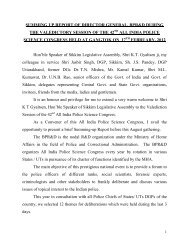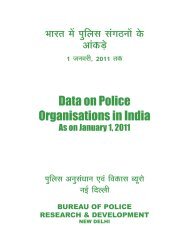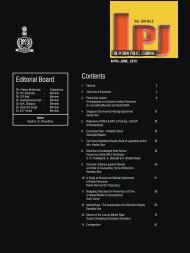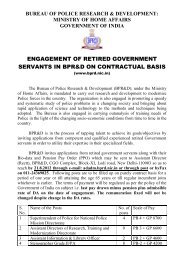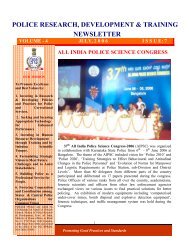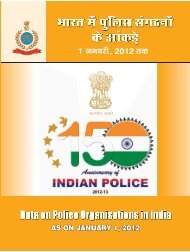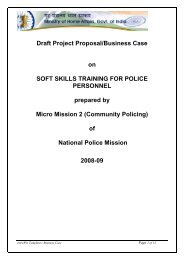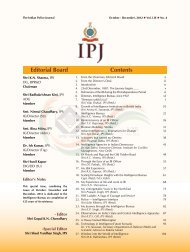SUPREME COURT & HIGHCOURT Rulings on POLICE
SUPREME COURT & HIGHCOURT Rulings on POLICE
SUPREME COURT & HIGHCOURT Rulings on POLICE
Create successful ePaper yourself
Turn your PDF publications into a flip-book with our unique Google optimized e-Paper software.
Facts<br />
Held<br />
1.2 : F.I.R. AND REGISTRATION OF F.I.R.<br />
Kuldip Singh vs State*<br />
In the instant case the petiti<strong>on</strong>er was c<strong>on</strong>fined in Jail as an undertrial. The informati<strong>on</strong><br />
laid by the petiti<strong>on</strong>er before High Court made an accusati<strong>on</strong> against the Jail Officials<br />
that they gave severe beating to him and thus they committed various cognizable<br />
offences. The petiti<strong>on</strong>er did received injuries. The nature of those injuries and whether<br />
the same were inflicted in the manner alleged by the petiti<strong>on</strong>er or were sustained as<br />
suggested by the Police is a matter which is still to be investigated under the Code of<br />
Criminal Procedure after registrati<strong>on</strong> of the case. It is not the case of the authorities that<br />
any investigati<strong>on</strong> or even enquiry was c<strong>on</strong>ducted by the Police or any intimati<strong>on</strong> was<br />
sent to the petiti<strong>on</strong>er. A Judicial Officer appointed under the directi<strong>on</strong>s of High Court has<br />
found prima facie substance in the allegati<strong>on</strong>s of the petiti<strong>on</strong>er. Thus in some<br />
appropriate proceedings it will have to be examined as to how undertrial petiti<strong>on</strong>er<br />
received injuries while in jail custody. Therefore High Court directed that FIR be<br />
registered and the investigati<strong>on</strong> be c<strong>on</strong>ducted expeditiously in accordance with law by<br />
the Crime Branch of Police.<br />
On informati<strong>on</strong> being laid before the Police about the commissi<strong>on</strong> of a cognizable<br />
offence the Police has no opti<strong>on</strong> but to register the case and then to proceed with<br />
investigati<strong>on</strong> of the case under the provisi<strong>on</strong>s of Chapter XII of the Code. The Police<br />
can also decide not be investigate in terms c<strong>on</strong>templated by Secti<strong>on</strong> 157 (1) of the<br />
Code. The Police has no right to refuse registrati<strong>on</strong> of a case <strong>on</strong> informati<strong>on</strong> being laid<br />
before it about commissi<strong>on</strong> of cognizable offence and instead proceed with an enquiry<br />
and refuse registrati<strong>on</strong> as a result of the said enquiry. If it is left to be determined by the<br />
Police to decide in which cases of disclosure or commissi<strong>on</strong> of cognizable offence it<br />
would first hold preliminary enquiry and then decide to register or not to register the<br />
case; it would also lead to delay in registrati<strong>on</strong> of the crime and in the meantime the<br />
material evidence may not be available. The c<strong>on</strong>duct, of enquiry itself may entail a l<strong>on</strong>g<br />
period. There may be then challenge to the said enquiry.<br />
The c<strong>on</strong>ferment of absolute and uncanalised discreti<strong>on</strong> to the Police to register a<br />
cognizable offence or not, would be violative of equality clause enshrined in our<br />
C<strong>on</strong>stituti<strong>on</strong>. The Code vests power in Judiciary to c<strong>on</strong>trol the discreti<strong>on</strong> of the Police.<br />
*1994 CrLJ.2502 (Delhi)





